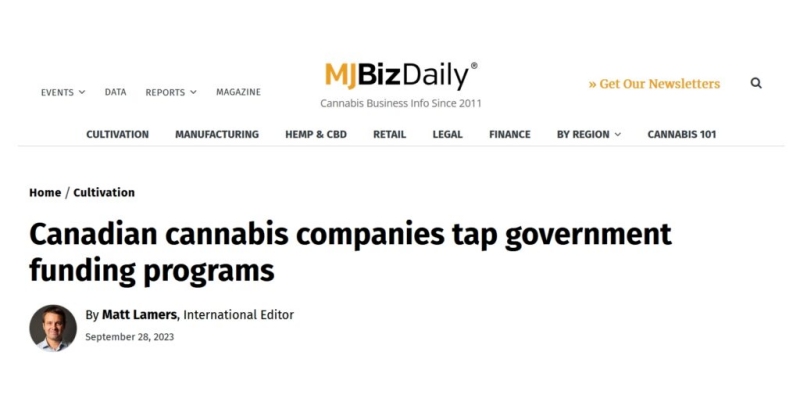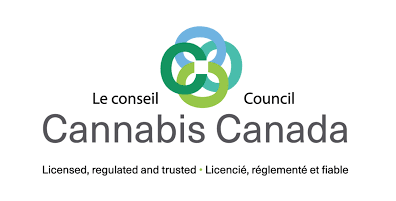Health Canada Seeks Feedback on Natural Products with Cannabidiol by June 5

A consultation is under way by Health Canada called: Towards a pathway for health products containing cannabidiol. The goal of this public consultation is to consider permitting cannabidiol (CBD) as a medicinal ingredient in natural health products. This would require amendments to Schedule 2 of the NHPR and the PDL.
“If these amendments are made, Health Canada would have the ability to regulate NHPCCs under the NHPR [natural health products containing cannabidiol]. Provided that a product licence application for an NHPCC meets the licensing requirements in the regulations, such products could then receive a natural product number (NPN). This number indicates that Health Canada has reviewed and authorized a product.”
In the consultation document, Health Canada states, “There has been continued interest from stakeholders to include CBD in health products available without a prescription and consumers who want to access them. As a result, Health Canada committed to looking at a potential regulatory pathway for NHPCCs that may be accessed without a prescription.”
The consultation began in March and the deadline for submission of feedback is June 5, 2025.
For more information on this consultation including how to participate visit:
https://www.canada.ca/en/health-canada/programs/consultation-towards-pathway-products-containing-cannabidiol/natural-health-products.htmlFor an in-depth analysis of this consultation visit Stratcann:
https://stratcann.com/news/health-canada-seeks-more-feedback-on-cbd-as-a-natural-health-product-and-cbd-for-pets/
Still Proudly Canadian-Owned and Operated

After more than 10 years in business, we are incredibly proud to remain 100 percent Canadian-owned and operated. From day one, our mission has been clear: to provide world-class products and services while staying true to our Canadian roots.
Every decision we make is guided by our commitment to support the Canadian cannabis industry — from Cape Scott to Cape Spear and every point in between.
With hard work, innovation, and the continued loyalty of our customers, we’ve built something truly special and truly Canadian.
Through our second decade in business, we hope to continue serving you with the same passion, dedication, and Canadian pride that has defined us since 2014.
Take a tour of AirMed to see what homegrown can do for you. Call us today at (877) 313-2442 or use the Request Demo button at the top of the page.
In the meantime, visit our Software page.
10 Ways to Increase Cannabis Profits in 2025

High taxes, market saturation, and increased competition are cutting into profit margins for cannabis producers in Canada. In some areas, oversupply has driven prices down, affecting profitability for both growers and retailers.
With so many challenges complicating efforts for legitimate businesses to thrive, what can cannabis producers do to increase profits? We’ve compiled 10 strategies to help you cultivate success in the upcoming new year.
1. Diversify Product Selection: Broadening your offerings to include edibles, topicals, oils, and tinctures can create a wider customer base.
2. Target Niche Markets: Focusing on specific demographics or consumer needs, such as organic or medical cannabis, can establish a unique selling proposition.
3. Expand Distribution Channels: Export markets can offer new channels for Canadian cannabis, but be aware that meeting compliance in other regions can be costly. There are, however, alternatives. Selling to GMP-compliant organizations is one. Another is boosting your reach in Canada by partnering with retailers or large distributors and by selling online through direct delivery programmes.
4. Educate Consumers: Providing educational materials about product benefits and applications can strengthen customer engagement and drive sales.
5. Enhance Quality Control: Establishing high-quality cultivation practices can lead to superior products allowing for premium pricing and inspiring customer loyalty.
6. Optimize Processes: Creating formulas for cultivation or manufacturing by developing repeatable plans, templates, and recipes can ensure success again and again and trim waste.
7. Operate Efficiently: Streamlining through automation, standard operating procedures and improved resource management can reduce costs and increase output.
8. Minimize Risks: Active prevention through workforce management, approval workflows, and incident tracking lowers expenditures resulting from errors and damages.
9. Systemize Compliance: Having a system in place to administer compliance and stay ahead of regulatory changes can protect profits.
10. Improve Decision Making: Utilizing business intelligence and data analytics to track operations and consumer trends can help you make better decisions toward future success.
By implementing these strategies, cannabis producers can position themselves for greater financial success in a competitive market.
For information on the many ways AirMed can help you improve profitability, click the Request Demo button at the top of the page and a team member will be in touch. In the meantime, visit our Software page.
Cannabis Industry Forecast for 2025

What’s in the cards for cannabis in 2025? We’ve rounded up some of the predictions.
A report from insurance brokerage Hub International states that “In a volatile marketplace, risk mitigation will separate success from failure.” The document contains results from HUB’s Executive Outlook Survey, which polled 900 C-Suite and VP-level executives on the issues facing them on profitability, employee vitality and organizational resilience. “Outlook 2025 Cannabis” discloses that 80% of Canadian cannabis companies identified rising costs as the biggest challenge to profitability, but only 65% feel prepared to address it. https://www.hubinternational.com/en-CA/insights/outlook/2025/cannabis/
BNN Bloomberg posted a video titled, “Challenges in Canada’s Cannabis Sector,” featuring an interview with Ben Kaplan, author of Catch A Fire: The Blaze and Bust of the Canadian Cannabis Industry. Kaplan, a Brooklyn-born and Toronto-based writer and editor and the founder of KIND Magazine distributed in Canada’s legal weed shops, claims the industry is currently “right-sizing”. https://www.bnnbloomberg.ca/video/shows/the-open/2024/12/24/challenges-in-canadas-cannabis-sector/
Ben Kaplan also penned an opinion piece for the Globe & Mail titled, “Forgotten in the cannabis crash is how the industry is a Canadian success story.” https://www.theglobeandmail.com/business/commentary/article-forgotten-in-the-cannabis-crash-is-how-the-industry-is-a-canadian/
Investing News Network published “Cannabis Market Forecast: Top Trends That Will Affect Cannabis in 2025.” While mostly focused on the U.S. market, the article mentions Canada. Overall, INN predicts that “2025 could be a year of transformation for the cannabis industry.” https://investingnews.com/cannabis-forecast/
For general and breaking news on the Canadian cannabis industry, visit one of the sites below.
Cannabis in Canada Review for 2024

There’s something about the end of one year and the beginning of another that makes people want to look back as they leap forward. End-of-year recaps are common in the news. But when we looked, we found many covering the U.S. cannabis industry and the process of decriminalization. But there were almost none about Canada. So we turned to ChatGPT, a type of artificial intelligence trained on large amounts of text data that uses an algorithm called a transformer to generate text. After scouring the Internet, ChatGPT came up with the following key developments for the Canadian cannabis industry in 2024.
Maturing Legal Market
The legal cannabis industry in Canada is entering its fifth year since the nationwide legalization in 2018. While the initial enthusiasm has settled, the market is now focusing on consolidation, innovation, and consumer education. Cannabis sales remain strong, but growth rates have slowed compared to the initial years. There is now a greater emphasis on quality and differentiation rather than simply expanding the market.
Industry Challenges
Despite initial optimism, the cannabis industry faces significant challenges:
- Profitability Issues: Many cannabis companies continue to struggle with profitability due to oversupply, high taxation, and competition from the illegal market. Prices have come down, but not always enough to outcompete illicit operators.
- Regulatory Hurdles: Companies are still navigating complex regulations, particularly around packaging, labeling, and marketing. The government has been slow to adjust some of these regulations to allow for more dynamic industry growth, such as expanding retail hours or reducing restrictive rules for cannabis advertising.
- High Taxes and Licensing Fees: The federal and provincial governments have kept taxes high on cannabis, which has affected margins for producers and retailers.
Expanding Product Offerings
In 2024, cannabis companies have expanded their product offerings, with a continued shift towards innovative products beyond dried flower, including:
- Edibles and Beverages: Cannabis-infused beverages and edibles have gained significant traction, providing a more discreet and enjoyable consumption method. These products are now a larger portion of the legal cannabis market.
- Vapes and Concentrates: Vaping continues to be popular among cannabis consumers, though it faces some regulatory scrutiny due to health concerns. Concentrates, like hash and distillates, are also on the rise.
- Medical Cannabis: Medical cannabis is still a crucial market, with more people accessing it for health-related reasons. New research and trials have also driven more interest in medical products, particularly those with a focus on CBD.
Consumer Trends
Consumer preferences have become more sophisticated. In 2024, Canadian cannabis consumers are looking for quality, consistency, and variety. This includes an increased demand for:
- Sustainable and Organic Products: Consumers are increasingly seeking environmentally friendly cannabis options, pushing producers to adopt sustainable farming practices.
- Microdosing: With more people seeking subtle, controlled experiences, microdosing has become a prominent trend, especially in edibles and tinctures.
- Brand Loyalty: As the market matures, consumer brand loyalty is becoming more pronounced, with established companies gaining recognition for their quality and reliability.
Legal Developments
The Canadian government continues to tweak the legal framework around cannabis in 2024. Several provinces are exploring the possibility of relaxing some restrictions:
- Expansion of Retail Stores: While Ontario leads in retail outlets, provinces like British Columbia and Alberta are increasing their number of licensed dispensaries, making cannabis more accessible to consumers.
- Home Cultivation Rules: Discussions around expanding personal cultivation rights are ongoing, with some provinces exploring allowing more plants to be grown for personal use, while others remain restrictive.
- International Market Opportunities: As Canada’s domestic market stabilizes, there’s growing attention on international markets for cannabis exports. Canadian companies are positioning themselves to benefit from the global cannabis boom, especially in Europe and emerging markets.
Social and Cultural Changes
Cannabis is now more ingrained in Canadian culture than ever. Public attitudes have become more accepting, especially regarding medical and wellness use. However, some societal issues remain:
- Concerns about Youth Access: Despite strict age restrictions, there are concerns about the accessibility of cannabis to minors, particularly through online sales or in neighborhoods with high retail density.
- Workplace Policies: As cannabis becomes more mainstream, workplaces are adapting to accommodate employees who consume cannabis. Employers are grappling with issues surrounding cannabis use, workplace safety, and testing.
The Black Market’s Continued Impact
The illicit cannabis market remains a significant challenge. Although legalization has greatly reduced illegal cannabis sales, the black market still exists, driven by lower prices, a wider selection of products, and a lack of trust in the legal system. Tackling the black market through regulation adjustments and lowering taxes is seen as a key area for future policy development.
Conclusion
Overall, the cannabis industry in Canada in 2024 is in a phase of refinement. While there are still challenges like profitability, regulatory barriers, and competition from the illicit market, the industry is maturing and diversifying its offerings. Consumer trends are shifting towards quality, sustainability, and innovation, while legal and regulatory adjustments are set to shape the market in the coming years. As Canada’s cannabis market continues to stabilize, the industry is positioning itself for long-term growth, both domestically and internationally.
Thanks ChatGPT! Content courtesy of https://chatgpt.com/.
If you are looking for media reviews of the cannabis industry that include some information on Canada, please click the links below:
https://www.reuters.com/legal/litigation/cannabis-2024-year-review-2024-11-13/
https://investingnews.com/daily/cannabis-investing/cannabis-market-update/
Happy New Year!

As we enter our second decade in business, we can’t help but look back on our industry’s history. Cannabis in Canada has certainly had its ups and downs, and we at AirMed have watched it from the inside, as have many of you. And as we welcome another new year, we do so with renewed commitment to Canada’s cannabis industry, to our partners and especially to our clients. May the New Year bring fresh insights, renewed energy, and exciting opportunities to you and to us.
We wish you a year filled with boundless opportunities, achievements and growth. Cheers to moving forward with positivity and purpose in 2025. From all of us at AirMed, Happy New Year!

Canadian Cannabis Leadership Summit: Oct 1 in Ottawa

Join the Cannabis Council of Canada for an afternoon of insightful discussion about the top issues facing the Canadian cannabis industry.
Bringing together leaders from the public and private sectors, as well as experts in medical research and financial services, this event will collectively advance issues which represent a risk to a properly functioning sector. Panel topics include in-depth conversation about the excise duty, the excise stamp, as well as reducing the regulatory burden. Following the conference, ticket holders will have the opportunity to engage with panelists during a private reception, providing a unique chance to network and deepen discussions on the most pressing issues. Secure your place at this event and ensure your voice is part of the conversation as we drive the Canadian cannabis industry forward.
Hosted in the O’Born Room at the National Arts Center (NAC) in Ottawa, just steps from Parliament Hill, this panel-style conference will run from 1 PM to 5 PM on Tuesday, October 1, 2024. For more information visit: https://cannabis-council.ca/events
Business of Cannabis Leadership Summit: April 24 in Toronto

Business of Cannabis: Toronto will bring together influential Canadian business leaders spearheading the industry, key investors and on the ground policy makers to discuss the next 5-years of business in the country and how imminent reform might affect the shape of the market there.
In this leadership summits, Business of Cannabis brings together global players, alongside financial and political figures for half-day laser focused program and high-level networking — to utilise data, insights and knowledge in order to arm businesses to best navigate the next phase of Canadian cannabis.
For more information visit: https://www.cannabistoronto.live/
ISO, SCC and the Canadian Cannabis Industry

ISO, the International Organization for Standardization, is an independent, non-governmental international organization with a membership of 170 national standards bodies.
Through its members, ISO brings together experts to share knowledge and develop voluntary, consensus-based, market relevant International Standards that support innovation and provide solutions to global challenges.
In Canada, the ISO is represented by the Standards Council of Canada (SCC). A Crown corporation, SCC was established by an Act of Parliament in 1970 to foster and promote voluntary standardization in Canada. SCC is independent of government in its policies and operations, although it is financed partially by Parliamentary appropriation.
When Canada legalized cannabis in 2018, SCC set about creating standards for the new industry believing that standards are essential for an effectively regulated marijuana market. These standards were considered groundbreaking when published in October of 2022.
ISO IWA-37, “Safety, security and sustainability of cannabis facilities and operations” is available for purchase through ISO in three parts.
Part 1 (ISO IWA 37-1:2022) covers requirements for the safety of cannabis buildings, equipment and oil extraction operations. https://www.iso.org/standard/84023.html
Part 2 (ISO IWA 37-2:2022) covers requirements for the secure handling of cannabis and cannabis products. https://www.iso.org/standard/84024.html
Part 3 (ISO IWA 37-3:2022) covers good production practices (GPP). https://www.iso.org/standard/84025.html
Taken as a whole, these documents provide invaluable direction to legislative bodies and emerging companies and help to create a safe, legal market for adults who use cannabis.
For more information from SCC visit: https://www.scc.ca/en/news-events/news/2022/new-guidance-from-iso-international-workshop-safe-cannabis-production
For more information from ISO visit: https://www.iso.org/en/contents/news/2022/10/standards_safe_legal_cannabis.html
To learn more about how AirMed helps you meet these standards, visit our Compliance page.
If you’d like to learn about our quality management and GPP offerings or discuss your specific needs, please give us a call at 1-877-313-2442 or use one of the contact forms.
Happy New Year!

Can you believe that 2024 is the 10th year AirMed has been in business? It’s true. We started in 2014!
A lot has happened in our industry during those 10 years, some good and some not-so-good. But we want you to know that we pledge our commitment to continued hard work and innovation, and we see great things on the horizon.
As we look ahead to the coming year, we send best wishes for a future filled with success and abundance to all our industry. Expect 2024 to be a year of new vistas and exciting possibilities for cannabis in Canada. Here’s to moving forward with positivity and purpose.
From everyone at AirMed, Happy New Year!

Season's Greetings

The staff at AirMed would like to wish all our industry the best this holiday season.
And we’d like to take this opportunity to thank all those who supported us this past year. We value the connections we’ve made with clients, future clients and partners as well as with other industry members.
Looking forward to working with you in the future, may this season bring you peace and joy.
MJBizDaily Publishes Series on Government Funding for Canadian Producers

In the first article of a series, MJBiz Daily reported “More Canadian cannabis companies are tapping government funding sources to finance research and other projects as private-sector capital has become harder to come by.”
That article, written by MJBiz Daily International Editor Matt Lamers, was published September 28, 2023 with the title “Canadian cannabis companies tap government funding programs.”
Lamers wrote, “MJBizDaily found that more than 3 million Canadian dollars ($2.2 million) worth of federal funding was provided to almost two dozen companies over the past year, according to the government’s Grants and Contributions portal.”
The second article, published October 3, 2023, reported that “Cannabis-related agricultural businesses based in Alberta are eligible for provincial funding under two programs if they meet certain requirements, the Ministry of Agriculture and Irrigation told MJBizDaily.”
The latest installment, published November 16, 2023, reported that the BC Ministry of Agriculture and Food explained via email that “federally licensed and commercial cannabis production is eligible for many of its programs and services.”
The author wrote, “Federally licensed cannabis producers in British Columbia are eligible to apply for a host of government programs, some of which provide funding, including the provincial portion of the Sustainable Canadian Agricultural Partnership.”
In the News Five Years After Cannabis Legalization in Canada

This month marked the fifth anniversary of the legalization of cannabis in Canada, and news outlets offered various views on the results so far. While some of the articles discussed the challenges and struggles facing the industry, others looked at different aspects.
CTV News reports that “Five years after cannabis legalization, 64 per cent of Canadians are in support of the move.” The article published on the CTV News website was about the results of an online survey conducted by Research Co. “Support for the legalization of marijuana is highest among Canadians aged 55 and over (66 per cent),” Mario Canseco, President of Research Co. said in a press release. “The proportions are lower among those aged 35-to-54 (56 per cent) and those aged 18-to-34 (48 per cent).”
The Canadian Medical Association Journal published “Outcomes associated with nonmedical cannabis legalization policy in Canada: taking stock at the 5-year mark.” This scholarly article reported, “Cannabis legalization in Canada appears not to have been the public health disaster anticipated by some of its opponents, but it cannot be described as a comprehensive or unequivocal success for public health either.”
https://www.cmaj.ca/content/195/39/E1351#ref-11
The Royal Gazette published “Canada and cannabis at Year 5,” which focused on three major aspects: the cannabis market, public health and social justice. “Canadian experience demonstrates there have been problems that must be responded to. But the ending of criminalisation that especially burdened Indigenous and Black people, the creation of a legal market providing untainted cannabis — the strength of which is clear — and the confronting of the illicit one that makes vast sums of money, pays no taxes and has no regard for the quality of what it sells must weigh heavily in the balance.”
https://www.royalgazette.com/opinion-writer/opinion/article/20231028/canada-and-cannabis-at-year-5/
Report: What We Heard

The federal government released a report that summarizes what a “five-person expert panel has heard over the past year as it engaged with almost 500 stakeholders in nearly 90 meetings across Canada.”
The report, titled “What We Heard,” describes the scope of the engagement and summarizes the responses in several categories including: public health, impact on young persons, impact on First Nations and more.
Read about the expert panel and review here: https://www.canada.ca/en/health-canada/services/drugs-medication/cannabis/laws-regulations/cannabis-act-legislative-review/expert-panel/legislative-review-cannabis-act-report.html
Read the report here: https://www.canada.ca/en/health-canada/services/drugs-medication/cannabis/laws-regulations/cannabis-act-legislative-review/expert-panel/legislative-review-cannabis-act-report.html
Stratcann summarized the report in an article published on their website on October 10, 2023, the same day the report was released.
Read the Stratcann article here: https://stratcann.com/other/canada-releases-what-we-heard-report-on-the-cannabis-act-review/
Global News followed up the release of the report with an in-depth article on the state of the cannabis industry in Canada. In the feature published on October 16, 2023, Global News offers commentary by several experts including George Smitherman, president and chief executive of the Cannabis Council of Canada.
Read the Global News article here: https://globalnews.ca/news/10027112/cannabis-act-review-canada/
Exporting Cannabis to the EU

In a previous post, we discussed how some Canadian producers are selling excess inventory to export markets, including Europe.
In “The Europe Medical Cannabis Market,” Market Data Forecast reports, “The medical cannabis market in Europe is expected to grow from USD 4.96 billion in 2022 to USD 13.37 billion by 2027, growing at a CAGR [compound annual growth rate] of CAGR 21.96% from 2022 to 2027.”
Based on that report, Europe appears to be a significant marketplace for cannabis. But to sell into that market, the exporter must meet the region’s standards. In the case of Europe, those standards include the European Union’s Good Manufacturing Practices, referred to as EU GMP.
In their article, “A Look at Canadian Cannabis Exports,” published in 2021, The Business of Cannabis reported one reason why exports jumped in 2020. “In Canada, more cultivators gained the European Union’s Good Manufacturing Practices (EU GMP) certification, allowing them to export to that continent. More than a dozen Canadian LPs now have EU GMP certified facilities.”
Meeting EU GMP standards is critical for exporting into the European marketplace. But what is EU GMP and how does it differ from the standards Canadian companies already meet?
Health Canada requires that Canadian licensed producers comply with Good Production Practices or GPP standards. If you are a licensed producer in Canada, you are already familiar with GPP. If not, these standards are explained on the Health Canada website.
Essentially, GPP requires that cannabis businesses have appropriate procedures for all activities related to producing a product that is safe for public consumption. GPP mandates that systems be in place to ensure quality and traceability.
Good Manufacturing Practices, GMP, takes GPP further including requiring more stringent testing.
The Foundation of Cannabis Unified Standards (FOCUS) states, “GMP is the proactive part of quality assurance. It is designed to minimize the risks involved in all steps of the manufacturing process. A basic tenant of GMP is that quality cannot be tested into a product. It must be built into each batch of product during all stages of the manufacturing process.”
Originally designed for pharmaceutical products, GMP can be applied to any production process and is a requirement for those wishing to market medical cannabis in Europe.
The EU GMP standards are complex, and the information can be difficult to navigate, especially how it applies to cannabis.
But the Canadian government has published guidelines designed to help manufacturers meet GMP standards. Their guidance document has been written “with a view to harmonize with GMP standards from: the World Health Organization (WHO); the Pharmaceutical Inspection Cooperation/Scheme (PIC/S); the International Council on Harmonisation (ICH); the International Cooperation on Harmonisation of Technical Requirements for Registration of Veterinary Medicinal Products (VICH); other regulatory agencies in other countries.”
While the EU is not mentioned specifically, these Canadian standards are a good starting point for cannabis companies considering exporting into other markets. These guidelines will help producers understand what is required and can be used as a stepping stone toward EU GMP certification.
According to the media, the EU standards are stringent, and certification can be time-consuming and costly. But with a market as large as Europe, Canadian companies are in a position to benefit from the opportunities that an EU GMP certificate can offer.
To access the resources quoted here, use the following links:
- https://businessofcannabis.com/a-look-at-canadian-cannabis-exports/
- https://www.marketdataforecast.com/market-reports/europe-medical-cannabis-market
- https://www.focusstandards.org/gmp-cannabis-industry/
- https://www.gmp-compliance.org/guidelines/gmp-guidelines
- https://www.canada.ca/en/health-canada/services/drugs-health-products/compliance-enforcement/good-manufacturing-practices/guidance-documents/gmp-guidelines-0001/document.html
Can Canadian Producers Export Excess Supply?

With media reporting oversupply challenges in the Canadian cannabis industry, can producers turn to export markets to sell their inventory? The answer might be yes. As countries around the world legalize cannabis, new opportunities are emerging for producers in Canada.
Canadian companies have been exporting cannabis for several years already. In fact, back in June 2020, MJBizDaily published a two-part article on Canada’s export of medical cannabis during 2019. Part 1 was titled, “Canada exported record amount of dried cannabis in 2019…” Part 2 reported, “Canadian exports of medical cannabis oil jumped fivefold in 2019.”
Canadian Regulatory Review reported in September of 2020 that the Canadian government had even become supportive of cannabis exports. “On the export side, and to further bolster trade, as of January 2020, the federal government through Canada’s Trade Commissioner Service extended trade commissioner services for Canadian cannabis companies exporting cannabis for medical and scientific purposes.”
A few months after that article, in April 2021, Prohibition Partners released a report called “Revealed: The Canadian Cannabis Export Market for 2020.” The report notes that the largest export markets for Canada at the time were Germany, Australia, Israel and the United Kingdom. “…new data shows a huge increase in the exports of cannabis from the country in 2020, as well as a changing network of countries that are importing from established producers in Canada.”
In May of that same year, Business of Cannabis took “A look at Canadian cannabis exports,” noting that “Dried cannabis flower and cannabis oil exports more than doubled in 2020, while imports dropped to virtually zero…”
An article titled, “How Canada’s Oversupply of Cannabis Is an Export Opportunity,” was published in October of 2022 by Canadian Cannabis Exchange. “As the demand for cannabis legalization increases internationally, Canada has the opportunity to become the world leader in cannabis exports… The European Union is proving to be a lucrative market for Canadian exports.”
To read the full articles quoted here, visit the following links:
- https://mjbizdaily.com/canada-exported-record-amount-of-dried-cannabis-in-2019/
- https://mjbizdaily.com/canadian-exports-of-medical-cannabis-oil-jumped-fivefold-in-2019/
- https://www.canadaregulatoryreview.com/international-trade-in-cannabis-international-and-domestic-regulatory-developments/
- https://prohibitionpartners.com/2021/04/30/revealed-the-canadian-cannabis-export-market-for-2020/
- https://businessofcannabis.com/a-look-at-canadian-cannabis-exports/
- https://canadiancannabisx.com/how-canadas-oversupply-of-cannabis-is-an-export-opportunity/
Thanks for visiting us at Lift Expo Toronto 2023!

The Toronto Lift Conference and Expo for 2023 happened last week at the The Metro Toronto Convention Centre.
What a great event with leading-edge content, live music, celebrity cameos, prize giveaways and more.
We’d like to thank everyone who dropped by our booth in the expo hall. We greeted as many of our customers (current and future!) as we could, and our team gave everyone a preview of the exciting changes happening to AirMed.
Thanks again for making Lift 2023 Toronto such an amazing experience for us.
For more information visit: Lift Expo
If you want a reminder of what AirMed has to offer for 2023, visit https://airmedcloud.com/intro-airmed-5/
For a personal tour of our software by one of our team members, click Request Demo at the top of the page or use the contact form in the footer.
See you this Friday at Lift Expo Toronto 2023!

The Toronto Lift Conference and Expo for 2023 is happening this week at the The Metro Toronto Convention Centre.
This event promises leading-edge content, live music, celebrity cameos, prize giveaways and more.
We’re setting up to greet as many of our customers (current and future!) as we can in booth 1023 in the expo hall. Our team can’t wait to show you the exciting changes to AirMed in person on Friday June 2.
For more information visit: Lift Expo
Certified Budtenders get free admission to the expo! Click here for more information: https://liftexpo.ca/tickets-toronto-2023/
If you want an advance peak at what AirMed has to offer for 2023, visit https://airmedcloud.com/intro-airmed-5/
For a personal tour by one of our team members, click Request Demo at the top of the page or use the contact form in the footer.
Lift Expo Toronto 2023 fast approaching Jun 1-3

The next Lift Expo is only weeks away taking place this June 1-3, 2023. Thousands of cannabis industry members are expected at this event being held at the The Metro Toronto Convention Centre.
Lift begins with the business conference on June 1, followed by an industry day on June 2.
Visit AirMed and hundreds of other exhibitors at the expo. Our team can’t wait to show you the exciting changes to AirMed in person in booth 1023 on June 2.
For more information visit: Lift Expo
If you are a Certified Budtender, your admission to the expo is free! Click here for more information: https://liftexpo.ca/tickets-toronto-2023/
For an advance peak at what AirMed has to offer for 2023, visit https://airmedcloud.com/intro-airmed-5/
For a personal tour by one of our team members, click Request Demo at the top of the page or use the contact form in the footer.
Health Canada Seeks Your Feedback from March 25 to May 24, 2023

In relation to a consultation on potential amendments to the Cannabis Regulations, Health Canada is seeking feedback and comments on potential amendments to the Cannabis Regulations.
The aims of the consultation include clarifying existing requirements, eliminating regulation inefficiencies and duplications and reducing administrative and regulatory burdens, and Health Canada is seeking input from:
- cannabis industry stakeholders
- public health stakeholders, non-governmental organizations
- researchers and research or academic institutions
- First Nations, Inuit and Métis partners and organizations
- law enforcement
- provincial, territorial and municipal governments
For more information including how you can provide feedback until May 24, 2023, visit:
https://www.canada.ca/en/health-canada/programs/consultation-potential-amendments-cannabis-regulations.html


